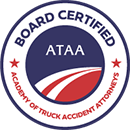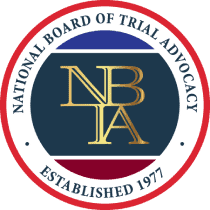Oversize Load Accidents
If you’ve ever driven behind a commercial truck with a black and yellow “OVERSIZE LOAD” flag affixed to the bumper, you know how intimidating it is to share the highway with an oversized load truck.
The fear we feel when navigating near these giants of the road is grounded in reality—a crash caused by an oversized load truck is highly serious, and often deadly.
If you or someone you love was injured in this type of commercial vehicle crash, reach out to an oversize load truck accident lawyer from Trucking Injury Law Group. We are a joint venture multi-state truck injury law office that focuses specifically on complex oversize load cases.
Our case consultations are always free to injured accident survivors and families looking for legal options.
What Is an Oversize Load Truck Accident?
An oversize load truck accident usually refers to a crash between a passenger vehicle and a commercial truck carrying cargo that exceeds maximum limits for weight, height, and/or length.
Truck accidents involving oversized loads are often much more serious than other types of commercial truck crashes.
This is due primarily to the larger, heavier presence of these vehicles, which also have more extensive blind spots, longer braking distances, and are more apt to become unbalanced while in transit.
What Makes an Oversized Load Trucking Accident So Dangerous?
A poorly-managed oversized load is extremely dangerous on the highway. Any collision involving a vehicle and cargo of this size and weight often leads to catastrophic injuries.
When trucks carry oversized loads, there is a higher risk of:
- Lost loads, rollovers, jackknifes, and loss of vehicle control
- Accidents caused by improper braking
- Bridge, tunnel, and overpass collisions
- Collisions with vehicles in an oversized truck’s blind spots
- Truck drivers losing control on hills and curves
- Mechanical failures and tire explosions caused by excess wear and tear on large trucks
The devastating injuries caused by these types of crashes often claim the lives of accident victims. Survivors who live through the crash typically experience a long, uphill battle to recovery paved with years of medical bills, lost wages, and other debilitating financial setbacks.
If you suffered injuries or lost a loved one in an oversize load truck accident, you deserve maximum compensation for your physical, emotional, and financial losses.
To learn more about the steps to recover compensation in a personal injury case, please contact Trucking Injury Law Group for a free case consultation.
What Is Considered an Oversize Load?
When a load exceeds federal and state regulations for maximum weight or dimensions, it is considered an oversized load.
Trucking companies have a legal obligation to know and understand all of the:
- Maximum weight, height, width, and length limits,
- Weight restrictions per axle,
- Oversize load permit requirements and how to obtain permits,
- Escort or pilot car laws,
- Road use restrictions,
- Laws for when flags must be used,
- Permitted travel times and travel routes,
- And other laws that apply in the jurisdiction where their vehicles will be operated.
State Regulations for Oversize Loads
Each state sets its own requirements for oversize load trucks. As the federal government does not issue oversize permits, those will need to be obtained from the state regulatory agency.
Additional road restrictions or closures, bridge and tunnel clearance information, tire chain requirements, pre-trip route survey laws, and other information specific to intrastate travel must be accessed through the state government website or published materials.
A compilation of state-specific size and weight limit laws can also be found on the DOT Federal Highway Administration website and other online resources.
Federal Regulations for Oversize Loads
The Federal Motor Carrier Safety Administration (FMCSA), as part of the U.S. Department of Transportation (DOT) that sets commercial trucking laws that apply at the federal level. The Code of Federal Regulations (23 CFR § 658.17) sets federal commercial truck weight limits at:
- 80,000 pounds maximum gross vehicle weight (except where weight must be lower based on a bridge formula)
- 20,000 pounds on any one axle
- 34,000 pounds maximum gross weight on tandem axles
Types of Oversized Load Truck Accidents
The mishandling of oversized loads can result in a few unique types of truck accidents. Truck drivers need to employ a special set of skills to safely drive an oversized truck, and any minor failure to meet safety standards can cause a serious collision.
Truck Driver Errors
One of the top causes of any type of truck accident is truck driver error. Just a few of the driver errors that can lead to an oversized load truck accident include:
- Distracted driving
- Braking too abruptly
- Not braking in a timely manner with consideration of increased braking distance
- Misjudging clearances
- Driving without a pilot car when required
- Oversteering
- Speeding or driving too fast for conditions
- Taking turns too quickly
- Driving while intoxicated
Overhead and Side Collisions
Colliding with surrounding buildings, guardrails, and other constructions is a very real possibility with an oversized load. Similarly, when a truck driver miscalculates clearance for a bridge, tunnel, overpass, or other transportation feature, the truck’s roof, sides, or load may collide with the structure.
Tire Blowouts
Due to excess weight on the wheels and tires, a blowout is much more likely under heavy loads. Poor road conditions, unbalanced cargo, speeding, hitting curbs or potholes, and drifting onto shoulders can also increase the risk of tire blowout in an oversize load truck.
Rollovers
A higher center of gravity, a larger surface area that can be caught in high wind, and a heavier gross vehicle weight all combine to make a rollover truck crash a serious danger when transporting an oversized load.
Jackknife Accidents
A jackknife describes a situation that happens when the truck cab stops suddenly while the trailer continues moving at an angle, creating a shape similar to a jackknife or pocketknife. When an oversized load is carried by momentum, it is more difficult to halt cargo motion when the truck driver brakes improperly.
The Investigation and Claims Process for Oversized Load Accidents
Because the investigation process for a large-load truck accident is such a complicated endeavor, it’s recommended that you first meet with a group of highly experienced lawyers to discuss what the process will involve.
If you have legal grounds to move forward with a truck accident claim, your oversize load collision attorney will be able to advise you on the steps you need to take to recover compensation.
We at Trucking Injury Law Group first meet with clients in a free consultation to evaluate the details of the case. Depending on the circumstances, we will often represent our clients by:
- Analyzing evidence, including traffic camera footage, police reports, trucking company records, and more, to determine the cause of the truck accident
- Reviewing federal, state, and municipal weight limits, special permit requirements, and other regulations that apply to the case
- Partnering with accident reconstructionists and trucking industry experts to fully understand the causes of the crash
- Identifying all liable parties that contributed to the accident
- Filing claims with the appropriate insurance providers
- Filing all necessary documentation within state-mandated statutes of limitations
- Negotiating with the insurance company for a full and fair settlement
- Litigating the case in trial if unable to reach an acceptable out-of-court settlement
From the moment we take your case, our truck accident lawyers will work tirelessly to make sure you win a fair outcome that places maximum value on your case.
Tips for Driving Safely Near Trucks Transporting Oversized Loads
Although there’s nothing you can do to stop negligent truck driver actions, many commercial truck accidents can be prevented by keeping a safe distance from trucks carrying oversized loads. When possible, stay far away from these large trucks altogether.
When you do need to share the road, keep in mind these tips for driving safely near trucks transporting oversized loads:
- Never tailgate or cut off overloaded trucks
- Leave more room than you think you need between your car and the large truck
- Remember that an oversized truck will require significantly more distance than passenger vehicles to come to a stop after braking
- Be aware of and give room to any pilot vehicles accompanying the oversize load truck
- Stay back and give plenty of clearance to oversized trucks making turns
- Always signal your turns, merges, and lane changes well in advance
- Keep your actions predictable and don’t make any sudden moves
- Stay alert—never drive distracted or under the influence of drugs or alcohol
Regardless of how many precautions you take, you may still be involved in a truck crash. If you suffered injuries, medical expenses, lost income, and other damages in an oversized truck accident involving negligence, you have the right to seek justice.
Trucking Injury Law Group can review your legal options with you during a free case evaluation.
Our Trucking Injury Lawyers Can Help
A big truck accident is a complicated legal matter. When an oversize load is a factor in the crash, you need to have a full understanding of laws for commercial trucks transporting various types of cargo, maximum weight limits at the federal, state, and local level, and much, much more.
Handling a successful injury claim requires the skills of an experienced truck accident lawyer. If you were injured in an oversize truck accident, our skillset aligns with your exact needs.
At Trucking Injury Law Group, we have spent combined decades honing our expertise in trucking accident law. When your truck accident was the result of load restriction violations, our truck accident lawyers will analyze the state and federal regulations that apply and find the evidence to build you a strong claim.
Our passion is defending the rights of trucking crash victims. And we have the strength to stand up for what’s right. Contact our legal team for a free consultation today.






